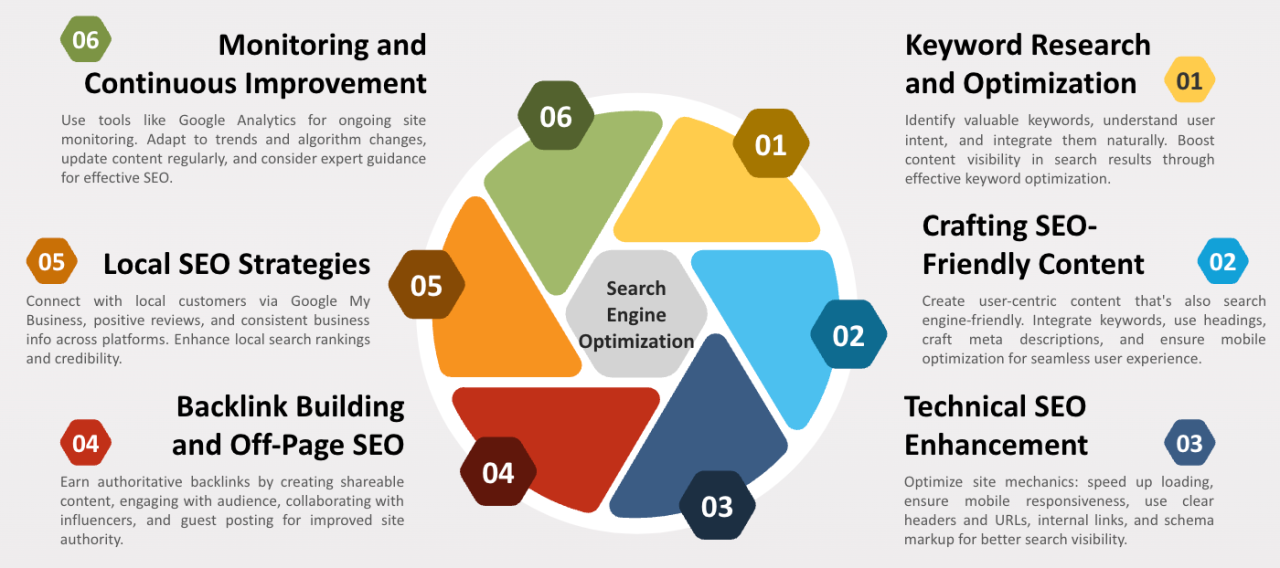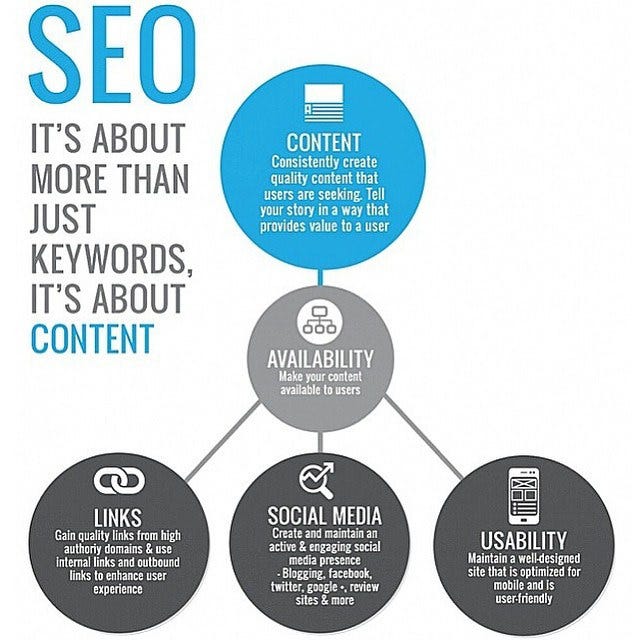Unlock the secrets to skyrocketing your content strategy with these essential SEO principles that will drive traffic and engagement.

Image courtesy of via DALL-E 3
Table of Contents
Welcome to the world of SEO! Have you ever wondered how some websites appear at the top of search results while others are buried deep down? That’s where SEO comes in. SEO, or search engine optimization, helps your content shine online. In this article, we’ll explore key principles that can make your content stand out and get noticed on the web.
Imagine SEO as a magic wand that helps search engines like Google find and understand your content better. By following these SEO principles, you can make sure your website gets the attention it deserves. So, let’s dive in and uncover the secrets of boosting your content strategy with SEO!
Are you ready to make your content irresistible to both search engines and readers? Let’s get started!
What is SEO?
SEO, which stands for search engine optimization, is a crucial aspect of creating content online. Search engines like Google use SEO to decide which content should be shown first when someone searches for a particular topic.
How Do Search Engines Work?
Search engines work by crawling through the vast amounts of content available on the internet, indexing it, and then ranking it based on relevance to a search query. This process helps search engines deliver the most valuable and relevant content to users.
Why is SEO Important?
SEO is essential because content that ranks higher in search engine results pages is more likely to be seen and clicked on by users. By optimizing your content for SEO, you increase the chances of reaching a larger audience and driving more traffic to your website.
Keywords: Choosing the Right Words
In the world of SEO, selecting the right keywords is crucial for making sure your content gets noticed by search engines like Google. But what exactly are keywords, and how can you find the best ones to use in your writing?
What are Keywords?
Keywords are specific words or phrases that people type into search engines when looking for information online. These words help search engines understand what your content is about and match it with the right audience. For example, if you’re writing about healthy recipes, using keywords like “easy healthy recipes” or “quick vegetarian meals” can help your content show up when someone searches for those terms.
How to Find Good Keywords
So, how do you go about finding the best keywords to use in your content? There are simple tools and methods that can help you identify relevant keywords that are popular with your target audience. Tools like Google Keyword Planner or SEMrush can provide insights into which keywords are being searched for the most often. Additionally, you can observe what keywords your competitors are using and consider incorporating similar ones into your content.
Creating Great Content
When it comes to boosting your content strategy through SEO, creating great content is key. High-quality, engaging, and valuable content not only attracts more readers but also helps your website rank higher on search engines. Let’s dive into some tips on how you can create content that stands out online!

Image courtesy of www.linkedin.com via Google Images
Writing for Your Audience
First and foremost, it’s essential to write for your audience. Think about what your readers are interested in and what questions they may have. By addressing their needs and providing valuable information, you can keep them engaged and coming back for more. Remember, the more engaging your content is, the more likely it is to be shared and recommended to others.
Using Keywords Naturally
While using keywords is crucial for SEO, it’s equally important to use them naturally within your content. Stuffing your content with keywords can make it sound unnatural and could potentially turn off your readers. Instead, aim to incorporate keywords seamlessly into your writing, making sure they fit contextually and enhance the overall flow of the content. This way, you can optimize your content for search engines without sacrificing readability and user experience.
On-Page SEO
On-page SEO is an essential part of making sure your content gets noticed online. It involves optimizing your website’s content to improve its search engine ranking. By understanding the basics of on-page SEO, you can make sure your content stands out in search results.
Using HTML Tags
HTML tags are like labels that tell search engines what your content is about. By using tags like headings, title tags, and meta descriptions, you can make it easier for search engines to understand and index your content. This can help improve your content’s visibility in search results.
Crafting Meta Descriptions
Meta descriptions are short summaries of your web pages that appear in search results. They give users a preview of what your content is about and can help them decide whether to click on your link. By crafting compelling and descriptive meta descriptions, you can increase the likelihood of users clicking through to your website.
Improving Your Website’s Speed
A fast-loading website is super important for SEO. When a website loads quickly, users are happy because they don’t have to wait around. Plus, search engines like Google love fast sites because they provide a good user experience. Websites that load slowly can make users frustrated and leave, which can hurt your search engine rankings.

Image courtesy of reputationdefender.medium.com via Google Images
Tips for Faster Websites
Here are some easy tips to help make your website load faster:
1. Optimize your images: Make sure your images are the right size and format for the web. Large image files can slow down your site.
2. Minimize HTTP requests: Reduce the number of elements on your page that need to be loaded, like scripts and stylesheets.
3. Use browser caching: Caching helps store elements of your website so they don’t need to be reloaded every time a user visits.
4. Enable compression: Compressing your website’s files can reduce the time it takes for them to load.
5. Reduce server response time: Check your hosting provider and make sure your server responds quickly to requests.
6. Minimize redirects: Redirects can add extra wait time for users. Try to limit the number of redirects on your site.
By following these tips, you can help improve your website’s speed and boost your SEO efforts.
Building Backlinks
Backlinks are an essential part of improving your website’s SEO. But what exactly are backlinks, and why do they matter for your online presence?
What Are Backlinks?
Backlinks, also known as inbound links or external links, are links from other websites that direct traffic to your site. Think of them as “votes of confidence” from other sites, telling search engines that your content is valuable and worth showing to users. The more high-quality backlinks you have, the more authority your site gains in the eyes of search engines.
Ways to Build Backlinks
Now that you understand the importance of backlinks, let’s look at some easy strategies to start building them:
1. Guest Posting: By writing articles for other websites in your niche, you can include a backlink to your site in the author bio or within the content.
2. Resource Pages: Reach out to websites that have resource pages related to your content and ask them to link to your site as a valuable resource.
3. Broken Link Building: Find broken links on websites in your industry and offer your content as a replacement, gaining a backlink in return.
4. Social Media Promotion: Sharing your content on social media platforms can lead to other websites linking back to it.
By consistently building high-quality backlinks, you can improve your site’s authority and visibility in search engine results, ultimately driving more organic traffic to your website.
Measuring Your SEO Success
Once you have implemented SEO strategies to improve your content, it’s important to track your progress to see how well your efforts are paying off. This process involves using specific tools and metrics to analyze the impact of your SEO tactics.

Image courtesy of www.linkedin.com via Google Images
Using SEO Tools
SEO tools are essential for measuring the success of your SEO strategies. These tools can provide insights into various aspects of your website’s performance, such as keyword rankings, backlinks, and site traffic. Popular tools like Google Analytics and SEMrush can help you track and analyze the effectiveness of your SEO efforts.
Understanding SEO Metrics
When it comes to measuring your SEO success, there are several key metrics to consider. These metrics can help you gauge the effectiveness of your SEO strategies and identify areas for improvement. Here are some essential SEO metrics to monitor:
Traffic: This metric measures the number of visitors to your website. An increase in traffic indicates that your SEO efforts are driving more people to your site.
Bounce Rates: The bounce rate shows the percentage of visitors who leave your site after only viewing one page. A high bounce rate may indicate that your content is not engaging or relevant to visitors.
Search Rankings: Monitoring your search engine rankings for target keywords is crucial. Improving your rankings can lead to increased visibility and website traffic.
By regularly tracking these metrics and using SEO tools to analyze your website’s performance, you can gain valuable insights into the effectiveness of your SEO strategies and make data-driven decisions to optimize your content for search engines.
Conclusion
By understanding and applying these essential SEO principles, you can significantly enhance your content strategy and achieve better results online. Remember, SEO is not just about ranking higher on search engines; it’s about creating valuable and engaging content that resonates with your audience.
Choosing the right keywords, creating high-quality content, optimizing your website’s speed, building backlinks, and monitoring your SEO progress are all crucial steps in improving your online visibility and reach. Incorporating these practices consistently will help you stand out in the vast digital landscape.
So, take the time to implement these SEO strategies into your content creation process. Measure your success, adapt where needed, and watch your efforts pay off as your content gains more visibility and traction. With dedication and perseverance, your content can reach a wider audience and make a lasting impact.
Want to turn these SEO insights into real results? Seorocket is an all-in-one AI SEO solution that uses the power of AI to analyze your competition and craft high-ranking content.
Seorocket offers a suite of powerful tools, including a Keyword Researcher to find the most profitable keywords, an AI Writer to generate unique and Google-friendly content, and an Automatic Publisher to schedule and publish your content directly to your website. Plus, you’ll get real-time performance tracking so you can see exactly what’s working and make adjustments as needed.
Stop just reading about SEO – take action with Seorocket and skyrocket your search rankings today. Sign up for a free trial and see the difference Seorocket can make for your website!
FAQs
What is the easiest way to start with SEO?
If you’re just starting with SEO and feeling a little overwhelmed, don’t worry! A simple way to begin is by choosing relevant keywords for your content. These keywords are the words or phrases that people type into search engines to find information. By using the right keywords in your content, you can help search engines understand what your website is about and make it easier for people to find you online.
How often should I update my content for SEO?
Updating your content regularly is essential for good SEO. Search engines like Google prefer fresh, relevant content, so by adding new information or making updates to your existing content, you can improve your website’s visibility in search results. Aim to update your content at least once a month to keep it current and engaging for your audience.







